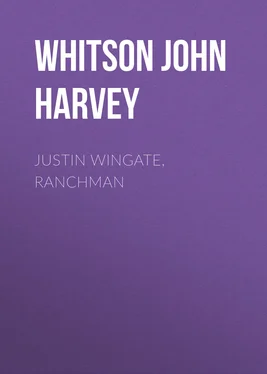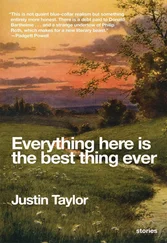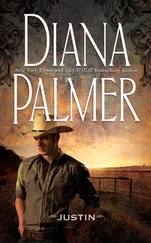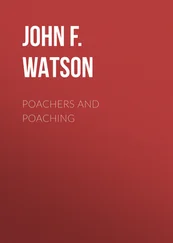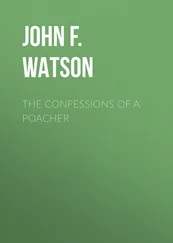John Whitson - Justin Wingate, Ranchman
Здесь есть возможность читать онлайн «John Whitson - Justin Wingate, Ranchman» — ознакомительный отрывок электронной книги совершенно бесплатно, а после прочтения отрывка купить полную версию. В некоторых случаях можно слушать аудио, скачать через торрент в формате fb2 и присутствует краткое содержание. Жанр: foreign_sf, foreign_antique, foreign_prose, на английском языке. Описание произведения, (предисловие) а так же отзывы посетителей доступны на портале библиотеки ЛибКат.
- Название:Justin Wingate, Ranchman
- Автор:
- Жанр:
- Год:неизвестен
- ISBN:нет данных
- Рейтинг книги:3 / 5. Голосов: 1
-
Избранное:Добавить в избранное
- Отзывы:
-
Ваша оценка:
- 60
- 1
- 2
- 3
- 4
- 5
Justin Wingate, Ranchman: краткое содержание, описание и аннотация
Предлагаем к чтению аннотацию, описание, краткое содержание или предисловие (зависит от того, что написал сам автор книги «Justin Wingate, Ranchman»). Если вы не нашли необходимую информацию о книге — напишите в комментариях, мы постараемся отыскать её.
Justin Wingate, Ranchman — читать онлайн ознакомительный отрывок
Ниже представлен текст книги, разбитый по страницам. Система сохранения места последней прочитанной страницы, позволяет с удобством читать онлайн бесплатно книгу «Justin Wingate, Ranchman», без необходимости каждый раз заново искать на чём Вы остановились. Поставьте закладку, и сможете в любой момент перейти на страницу, на которой закончили чтение.
Интервал:
Закладка:
Fogg broke into a roar of laughter. Sanders flushed slowly; and getting up walked to the other end of the room, chewing wrathfully, splintering the story with his teeth as he splintered the grass blades that he plucked and chewed when walking about to view the valley land.
“Huh!” he grunted, coming back and dropping lumpily into his chair. “Tell that to a fool an’ mebbe you’ll git a fool to believe ye, but I don’t!”
Fogg slapped his fat knee and roared again.
“Ha, ha! Ho, ho! Ask him something else, Sanders! Who-ee! Doc, I didn’t think it was in you! If you do anything like that again I’ll have to let a reef out of the band of my trousers. Fire another question at him, Sanders.”
“No,” said Sanders, while a sullen fire glowed in his little eyes; “I was goin’ to ask him some other things, but I’m done!”
Then he chewed again, tried hard to laugh, and seemed about to say something; but Fogg broke in.
“I say, Doc, you can tell a story so well you’d ought to be in my line. Story telling is my long suit. Lincoln ought to have altered his immortal saying before giving it to the world. My experience is that if you keep the people in a good humor you can fool _all_ of them _all_ of the time, and there ain’t any better way than by feeding them anecdotes and jollying them until they think they are the smartest ever. For instance, Sanders believes in fortune tellers; they jolly him, and that pleases him, and they get his coin. It’s the same way with everything and everybody.”
In addition to the photographic apparatus stored in the wine-colored wagon Fogg had a collection of Navajo blankets, Pueblo pottery, Indian baskets, bows and arrows, and such things. Seeing that his host was not to be a purchaser, and being in a communicative mood, he did not hesitate to expose now the secrets of his trade, in proof of his view of the gullibility of the general public.
“See that,” he said, taking up a hideous image of Pueblo workmanship. “Ninety men out of a hundred will believe that thing, with its froggy mouth, is a Pueblo idol, without you telling them, and the others will believe it when you do tell them.”
“Huh!” grunted Sanders, still angry; “if 'tain’t an Injun idol, what is it?”
It seemed natural for Fogg to laugh, and he laughed again, with easy gurgling.
“You may call it anything you want to, but it ain’t an idol. I’ve seen Pueblo idols; there’s a room full of them in the old Governor’s Palace in Santa Fé, and they look more than anything else like stone fence posts with holes gouged near one end for the eyes, nose and mouth. Them are genuine old Pueblo idols, but you bet the Pueblos didn’t sell them, and they didn’t give ’em away. Did you ever know of a people that would sell their God? I never did.”
“None, except Christians!” said Clayton, speaking slowly, but with emphasis.
Fogg set the staring image on the table and looked at him.
“I hadn’t thought of that. Yes, I reckon they do, a good deal of the time. But an Indian wouldn’t; he would never sell his God. Maybe it’s because Christians think so little of theirs that they’re so ready to believe a Pueblo will sell his for 'most any old thing. Them images are just caricatures, made to sell. I go among the Pueblos three or four times a year and buy up a lot of their pottery, and I encourage them to make these images, which the average tourist thinks are gods, for they sell better even than the water jars and other things that they turn out.
“Then I buy blankets of the Navajos, which they make dirt cheap now. I helped to put ’em onto that. You can sell a dozen cheap blankets easier than a single expensive one, especially when the people you’re selling to think they’re getting the genuine goods at a bargain. It’s easier for the Navajo weavers to tear old government blankets to pieces and re-weave them and color them with analine dyes than it is for them to take their own wool and their own dyes and put the things together in the old way. They won’t wear of course, and the colors fade, but they sell like hot cakes.
“I buy for a dealer, who snaps up everything of the kind I can bring him and hollers for more. You ought to see the crowds of people, especially tourists, who wear out his floors. I’m going to have a store of that kind myself some day. I take photographs for him, of scenery and other things that will sell; and bring him loads of basket work and bows and arrows from the Jicarilla Apaches just over the New Mexican line. He grabs for the Jicarilla work, which I can get almost cheaper than anybody, for I know the head men. The Jicarillas used to be slow workers and too honest, like the Navajo weavers; but they’re onto their job now, and can put a willow basket together and dye it with patent dyes in almost no time.”
Thus Lemuel Fogg discoursed of his business methods, until he had succeeded in proving several things concerning himself, in addition to his easy belief that the whole world is either covetous or dishonest.
Fogg departed the next morning, on his way to Denver. Sanders lingered in the valley for two or three days, peeking and prying, at intervals visiting a fortune teller of local repute in the town, who saw land, houses, and cattle for him, in the grounds of a coffee cup. But he was angered against Clayton and did not return to his house. A dozen times he told inquiring farmers that he “reckoned” he would take land there and become one of them. But the grounds in the coffee cup did not settle just right, and at length he, too, departed.
CHAPTER IV
SIBYL
One day there came, across the level lands, a wave of horsemen and hounds in a rabbit hunt, the baying of the dogs breaking sharply on the peaceful calm of the valley. Justin rushed from the house when he heard the clamor. Clayton followed more slowly, and looked across the valley from his doorway. The flutter of skirts told him that some of the saddles bore women. He frowned. This slaughter of rabbits was particularly distasteful to him, though he knew that the few farmers on the low land by the stream would welcome it, if the horses and dogs did not cut up the cultivated fields.
Big gray jack rabbits, routed from their coverts, were bobbing on in advance of the baying hounds and galloping riders. More rabbits were seen to start up, bouncing out of bunches of grass or scattered clumps of sage. Following behind, driven at a lively gait, came a mule team, drawing a light spring wagon into which the slain rabbits were thrown.
The extended line had advanced in a big semicircle; and the ends bending in, the chase drew on toward the solitary home of the solitary doctor. Justin was filled with excitement. The lust of killing, which seems to be in the racial blood, stirred strongly within him, and was only held in partial leash by certain teachings and admonitions well hammered in by his instructor. Suddenly, quite carried away, he swung his hat and yelled:
“Mary is on one of those horses! See her, out there on the right side, on the white horse! She must have been at the station and joined them when they started.”
Clayton drew back from the doorway without a glance at the form of Mary Jasper borne onward with flying leaps. A rush of disgust shook him, so that he did not care to look longer. But Justin remained outside, swinging his hat and whooping at intervals, quite taken out of himself.
Then a louder clamor, and a cry from Justin, drew Clayton to the door again. One of the rabbits was approaching the house, springing on with indescribable swiftness, yet unable either by running or dodging to shake off the pursuit of the lithe-limbed, baying creatures that cleft the air behind it. Two of the foremost of the hounds were in chase of this rabbit, one twenty yards in advance of the other. Pushed hard, the rabbit crouched and dodged again with such celerity that the hound, whose open mouth at the instant was almost closing on it, was thrown headlong in a frantic effort to stop and turn as quickly as the rabbit itself. The second hound rushed at it, and the change of direction flung the fleeing rabbit upon the bit of trampled grass in front of the open door in which Clayton stood.
Читать дальшеИнтервал:
Закладка:
Похожие книги на «Justin Wingate, Ranchman»
Представляем Вашему вниманию похожие книги на «Justin Wingate, Ranchman» списком для выбора. Мы отобрали схожую по названию и смыслу литературу в надежде предоставить читателям больше вариантов отыскать новые, интересные, ещё непрочитанные произведения.
Обсуждение, отзывы о книге «Justin Wingate, Ranchman» и просто собственные мнения читателей. Оставьте ваши комментарии, напишите, что Вы думаете о произведении, его смысле или главных героях. Укажите что конкретно понравилось, а что нет, и почему Вы так считаете.
